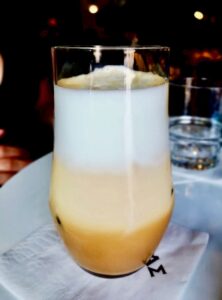The second stop of our little travel into the world of coffee is Greece, accompanied by Eleni.
I enjoyed our conversation from the start because she opened by saying that in Greece any time is coffee time! That’s how every Greek consumes 5.5 kg of coffee per year. Impossible you say? Not if you can choose among a variety of caffeinated drinks.
All-year-around good choice is the traditional Greek coffee, made by boiling the fine ground coffee powder in the typical pot called briki, then steering and finally waiting just a bit for the coffee powder to precipitate. Important warning: you need to know how sweet you like your coffee upfront because sugar is added at the moment of preparation. Sweetness levels go from half sweet, sweet, to very sweet or …just black when your life is already sweet enough ;D (not realistic, right?).
Traditional Greek coffee is a variation of the Turkish coffee brought to Greece during the Ottoman invasion, presuming around 1750.
Then we go to the summer options.
- Frappe, made by adding instant coffee to cold water. Shake it, then add ice and lastly milk (or even ice cream, if you like to follow Eleni’s dad’s advice!). It turned out to be an unexpected beverage obtained in 1957 at the Thessaloniki International Trade Fair.
- Freddo espresso: espresso coffee in which you add ice and shake it.
- Freddo cappuccino: same as freddo espresso with the addition of milk foam on top and, if you like, a pinch of cinnamon.

Coffee in Greece is a very strong part of the country’s cultural identity. Drinking coffee is a ritual. People take their time for it, and by that, I mean hours because everything, basically, fits in a cup of coffee: gossip, work-talks, socializing, healthy discussions… Based on this, I concluded that the high amount of coffee consumption is not due to the need of caffeine per se but to the social environment around coffee drinking. Nice, eh?
Back to Eleni, she likes the traditional Greek coffee, no sugar (her life is already sweet enough ;D), just black and strong. She started drinking coffee when she was at the University and the intake increased during her PhD, in line with every good PhD. She drinks it because it makes her more energized during the day. This is a notorious effect of the caffeine which binds to the receptors of adenosine, preventing (at least for some time) to feel drowsy and tired.
When you are abroad, coffee made right is not easy to find. It is an endeavor every serious coffee drinker goes through, and finally (when lucky) finely selects the (almost) right place where the ritual can be continued. I guess for Greek students in Wageningen the right place is only back home. But at least for a few years the important thing is that there is a harbor for them to ritually meet.
A good thing to know is that even if you are not at all into coffee, you are still welcome to invite a Greek friend to go for a coffee, as long as you are up to enjoy the pace of Greek coffee drinking.
